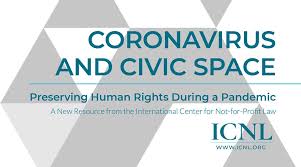 The COVID-19 pandemic is accelerating efforts among authoritarian governments as regimes tighten their grip at home while seizing the opportunity to advance their agenda abroad, argues senior policy adviser James Lamond. Over the past several years, autocratic governments have become increasingly assertive in nature, he writes for the Center for American Progress:
The COVID-19 pandemic is accelerating efforts among authoritarian governments as regimes tighten their grip at home while seizing the opportunity to advance their agenda abroad, argues senior policy adviser James Lamond. Over the past several years, autocratic governments have become increasingly assertive in nature, he writes for the Center for American Progress:
As former NATO Secretary General Anders Rasmussen testified before the U.S. House of Representatives in February 2019, “Tyranny is once again awakening from its slumber.” This assertiveness does not stop at national borders; just last year, the U.S. Intelligence Community warned that “Russia and China seek to shape the international system and regional security dynamics and exert influence.”… Modern authoritarian regimes have made the argument to their people that their model of government is stronger and better suited to tackle large-scale challenges than so-called messy democracies.
The coronavirus will likely transform other pillars of democratic governance—such as electoral processes, civilian control of militaries, and civic mobilization—and potentially reset the terms of the global debate on the merits of authoritarianism versus democracy, according to a new Carnegie Endowment analysis. The pandemic will almost certainly usher in broader effects on governance by overburdening countries’ basic governance functions, taxing their sociopolitical cohesion, exacerbating corruption, unsettling relations between national and local governments, and transforming the role of non-state actors, say authors Frances Z. Brown, Saskia Brechenmacher and Thomas Carothers of Carnegie’s Democracy, Conflict, and Governance Program.
Four interrelated areas of concern stand out in this rush toward new emergency powers and restrictions, they observe:
- CENTRALIZATION OF POWER: Illiberal leaders are taking advantage of the crisis to further weaken checks and balances and erode mechanisms of accountability, thereby entrenching their positions of power. In Hungary, for example, a new law allows Prime Minister Viktor Orbán to rule by decree indefinitely, without any parliamentary oversight….
- ABRIDGMENT OF FUNDAMENTAL RIGHTS: Some authorities are already using the crisis—and their emergency powers—to abridge citizens’ fundamental rights. One particularly clear trend is heightened control over free expression and the media, under the guise of fighting “misinformation” about the virus. The Chinese government has censored information about its response and detained journalists who reported on the outbreak…..
-

POMED
EXPANDED STATE SURVEILLANCE: The crisis is also accelerating governments’ use of new surveillance technologies. In Israel and South Korea, for example, governments are using smartphone location data to track down citizens who may have been exposed to the virus. In Hong Kong, new arrivals must wear electronic location-tracking wristbands; Singapore does extensive contact tracing and publishes detailed information about each known case. While enhanced surveillance is not per se antidemocratic, the risks for political abuse of these new measures are significant ….
- BANISHING PROTESTS: There is a risk that governments may use the current need to restrict public gatherings as a pretext to crack down on the wave of antigovernment protests that have roiled global politics over the past several years. In Algeria, for example, where major protests last year pushed the government toward some political reforms, authorities have banned all protests, marches, and demonstrations….
 Why does Viktor Orban’s de facto coup matter? asks National Endowment for Democracy (NED) board member Anne Applebaum. Because although Hungary is a small country, it is one whose creeping authoritarianism is widely admired. In early February, I wrote about the rapturous reception that Orbán had received at a conference of self-declared nationalist and far-right intellectuals, she writes for The Atlantic.
Why does Viktor Orban’s de facto coup matter? asks National Endowment for Democracy (NED) board member Anne Applebaum. Because although Hungary is a small country, it is one whose creeping authoritarianism is widely admired. In early February, I wrote about the rapturous reception that Orbán had received at a conference of self-declared nationalist and far-right intellectuals, she writes for The Atlantic.
The COVID-19 pandemic and the resulting economic crisis will have a profound effect on the world, including potential threats to democracy, CAP’s Lamond adds. For more on how the United States should respond to threats to democracy, see “Don’t Let the U.S. Response to the Coronavirus Crisis Do More Damage to Democracy” by Brian Katulis and Trevor Sutton.







